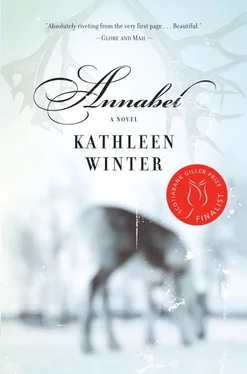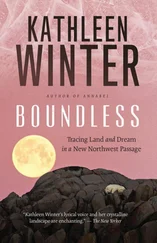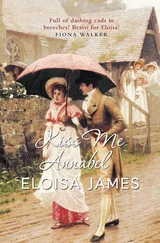Thomasina bent over Jacinta and the baby in a midwife’s fashion, a ministering arc, and wrapped a blanket around the child, a cotton blanket that had been washed many times. She did not believe in putting anything new or synthetic next to a newborn’s skin. As she adjusted the blanket she quietly moved the one little testicle and saw that the baby also had labia and a vagina. This she took in as Treadway, in another room, threw his teabag in the garbage, as he gave his crust to the dog and clicked shut the front door, as he went out on the last perfect duck hunt of his days, and she let Treadway go. Thomasina asked Eliza and Joan to get the warm towels for Jacinta. She herself handed Jacinta the thick pad to soak up the postpartum blood, and helped her into the terrycloth robe that Jacinta would wear for the next few days.
Then she said, “I’m going to ask the others to leave, if it’s all right with you. We have something to talk about.”
HAD WAYNE NOT BEEN BORN IN 1968 in a place where caribou moss spreads in a white-green carpet, and where smoke plumes from houses, and where gold sand is so remote no crowds gather — the sand is a lonely stretch under the northern lights — things might have gone differently. Treadway was not an unkind man. His neighbours said he would give you the shirt off his back — and if that shirt had not been full of sweat from hauling wood and skinning animals and auguring ice, he might indeed have done so. He was a soft-hearted man when it came to anyone he felt was less practically talented than himself, and this covered a lot of people. He would help a man split wood, build a house, or cut a hole in the right place in the ice, not to show off his superior skills but to save the man time. He did these things out of pure helpfulness, with kindness thrown in.
Pure kindness he saved for his dogs. On one hunting trip he had accidentally shot the eye of his old English setter, a mild-mannered dog whose jaw quivered with tenderness around any bird Treadway asked it to carry. Treadway had ended the trip although it meant he would have to launch it again later, at considerable expense in provisions and time, in order to have enough duck in store for the winter. He had carried the dog a hundred miles on his sled and paid Hans Nilsson the veterinarian a hundred dollars to get up in the middle of the night and tend to the wound, and when Hans told him the dog had to lose the eye, Treadway cried because it was his fault, and he did not eat again himself until the dog could eat, not even when Jacinta fried meat cakes with knobs of pure white pork fat and juniper berries in them. He believed sight to be something the dog loved, valued, and even enjoyed, and it hurt him deeply that he had ruined the dog’s ability to practise the talent for which bird dogs are born. He kept the dog though it could no longer hunt, and no one in Treadway’s ancestry had ever kept a dog that was just a pet, until the dog grew old. Only when the dog grew so arthritic it could not walk without pain did Treadway consent to have it put down, and on that day he walked to the river and stared at the water for more than an hour, thinking about not just how he had failed his dog but how he could be a better man all around if he paid more attention to every detail and let nothing pass that was off-kilter.
After he lost that dog, Treadway hauled and skinned and sweated, and, in his own way, he loved. He loved Jacinta because she was decent and kind to him; the last thing he wanted to do was to hurt her. He played games with her in the part of the season when he lived at home, games she liked, such as cribbage, which she had taught him when they were first married. He had to force himself to do it, to take his mind off the way he planned to sharpen the runners on his sled or condition the jaws of his traps with seal oil, but he did tear himself away from these things so that when he was with her, she would not feel that his mind was far away. He felt a tenderness that was, in part, a feeling of being sorry for her, for she had to stay indoors and lead a gentle life unconnected with all that was great and wild, and he did not see how she could enjoy this. He knew, during the crib games and the times they ate intimately together over the lamplit table, that she would have liked something more, but he did not know what it was. He did not know it was the city she came from, it was rain on the slate roofs of the shops on Water Street in that city, it was a man who would read poetry and philosophy but not keep it from her, who would lay the book right there on the table, beside the bread and the fragments of roast duck leg and the wine, and would talk about it with her.
Days after the birth, in the manner of secrets held from the world of husbands, Treadway had not been told the truth about his child. Jacinta examined her baby with gentle fingertips when Treadway was not in the room, and when he was, or when neighbours visited with bakeapple tarts and partridgeberry cake and hot caribou stew baked under a thick crust with gravy bubbling out of the knife holes, she gazed on her child with the full power of her concentration, and nothing could break that gaze. Neighbours walked and talked around her, and it was as if she were underwater and they were not, and this did not seem too different from the way it normally was with a new mother and her child. No one expected her to come up with idle conversation.
It was Thomasina who took care of the linguistics. Thomasina who, by miracles of deflection, managed to leave unspoken the first thing spoken of any newborn. To Treadway she appeared the most sensible of his wife’s friends.
“Eliza Goudie,” he had once told Jacinta, “spends far too much money on white sandals and those dresses out of the catalogue, the ones covered in blisters.”
“Seersucker.”
“And white sandals. Things that are not practical to wear in this climate.” And he could not get over the fact that Joan Martin had forbidden her husband to pile wood near their house so she could plant some kind of fancy tulip that should grow only in a botanical garden somewhere.
“Emperor,” said Jacinta. “Those are Emperor tulips.”
It was a testament to Thomasina’s powers that she managed to stay eight days in Treadway’s house without his protesting. Not even Jacinta’s mother had been able to do that, when she was alive. Treadway did not ban a person outright, but he had an ability to give off such a chilled and hostile response to any guest who overstayed her welcome that no guest, not even the most impermeable, could stand it. He was a man who did not want strangers to observe his routine, not that there was anything remarkable about his habits. He simply liked to inhabit his house, when he had to inhabit it, and go about his ordinary pathways in it without being looked at or talked to, except by his own wife, who did not appear to him to mind it when he ignored the fact that she was there.
“If I didn’t say anything to him,” Jacinta sometimes told Joan and Eliza, “I think he could go a whole year without speaking to anyone but his dogs.” She said this, though she felt disloyal, when she got caught up in the women’s derisive talk about husbands in general. And because they knew things like this about him, Joan and Eliza had an air about them, one Treadway could detect, of faint amusement towards him, and he could not tolerate them in the house, so when he was home, they hardly ever came. But because she had more gravity than they did, and because she did nothing for herself and everything for Jacinta and the baby, Thomasina was able to stay the eight days without Treadway’s disapproval, even though it meant the only time he had alone with his wife was the half-hour before sleep.
“Everything all right?” he asked Jacinta on the eighth day, his huge, comforting paw heating her belly down into her skin, her fat, her womb and ovarian tubes and ovaries, down into the small of her back. She did not tell her friends about his calm heat, or about the deep trust she had in his ability to create a secure home. There were a lot of instabilities in Eliza’s home. Her husband drank, and she was forever falling in love with someone — this year it was her children’s new geography teacher, a man ten years younger than Eliza, who had come from Vermont and lived in an apartment in the local wildlife officer’s basement. Eliza’s infatuations were always one-sided, but they powered her in a way her real life did not, and as a result her own house always felt uninhabited by her, and her children and husband walked around lost in it. Joan was less susceptible to falling in love, but her husband was not. All of Croydon Harbour knew he had an Innu wife in the interior, and that while Joan had no children, his other wife had three daughters and a son.
Читать дальше












